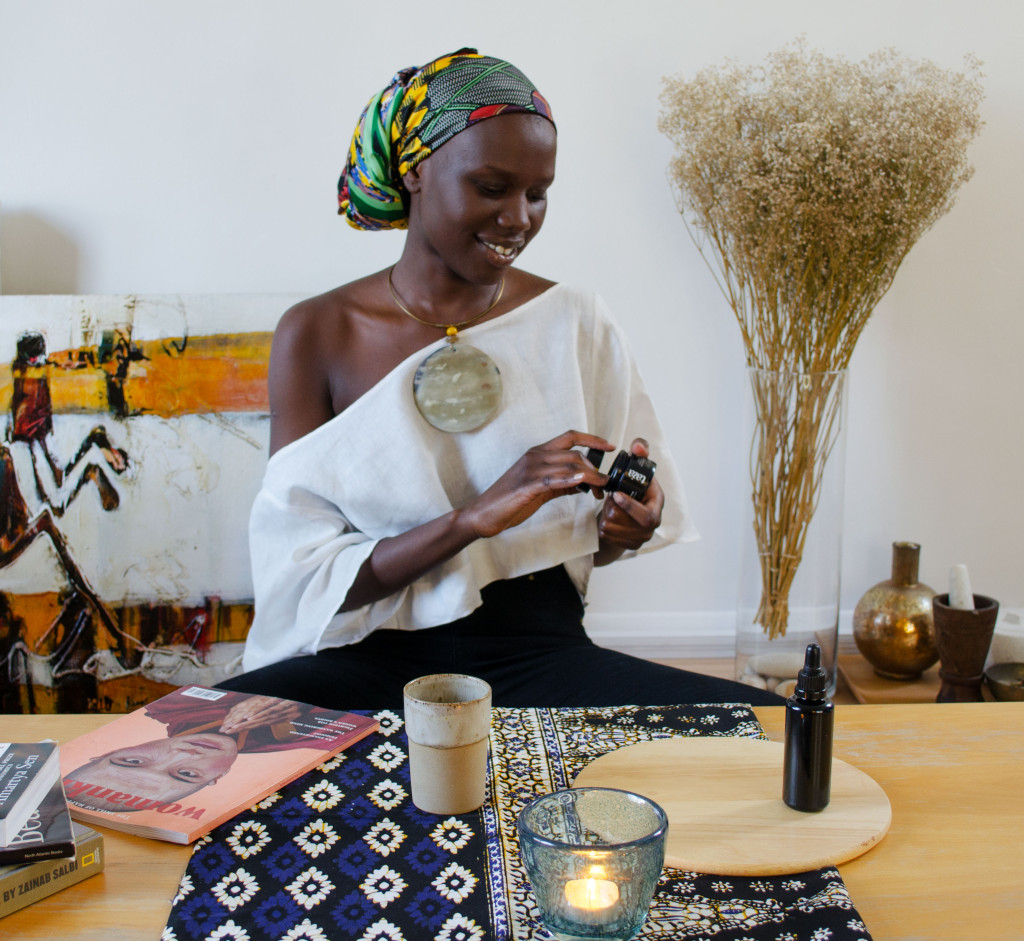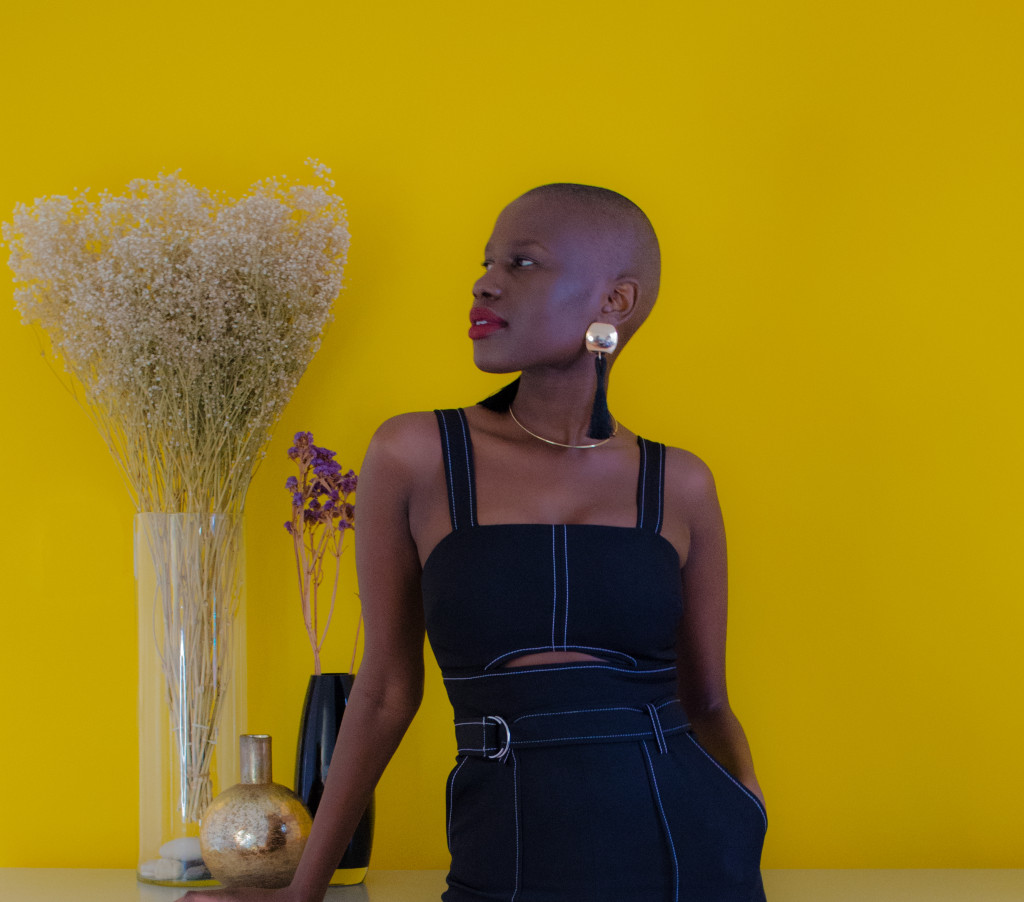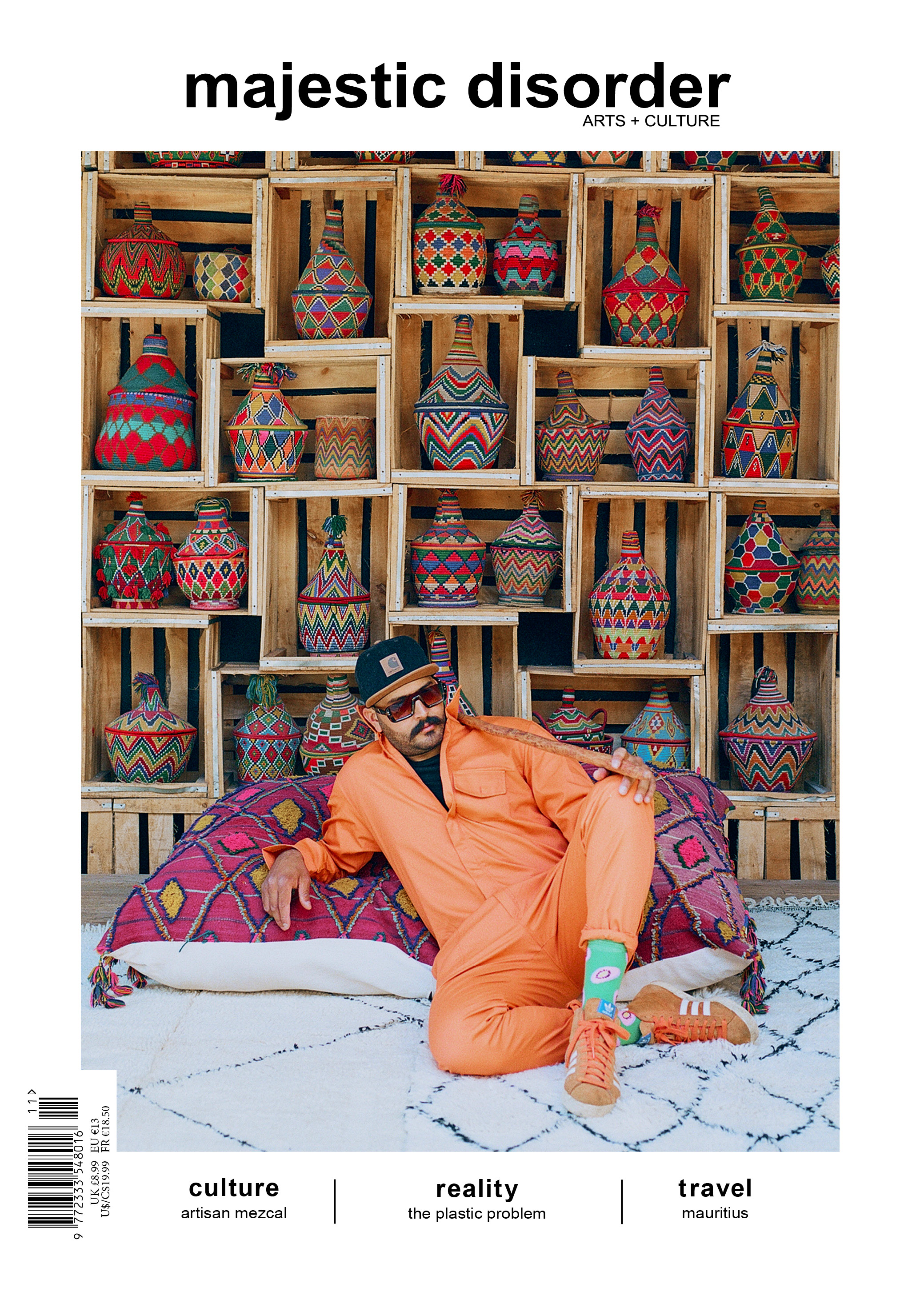Natural Beauty
Interview Brittany Chang
Photography Su Ong
For natural beauty brand TAIA’s founder Muji Othol, beauty is more than skin deep.
At the foundation are sustainable skincare collections harnessing unique botanicals indigenous to Africa, but for London-based Muji, this journey has also been a connector to her ancestral roots in South Sudan.
Although the idea for TAIA took years to fully rub in, it first came to Muji during a trip to her native South Sudan in 2013, just months before the civil war erupted that is still devastating the country and has created a refugee crisis of more than 2.4 million people.
As Muji works with local women in the region to produce TAIA, which she founded last year, the brand is evolving beyond economics to add a cathartic support for the South Sudanese refugees she intends to be working with.
We sat down with Muji to discuss her passionate pursuits exploring the crossroads between economics, sustainability and female empowerment and how they’ve all been woven together in her vision:

Can you tell me a bit more about your natural beauty brand TAIA and your mission to support rural women producers?
In the communities where many of our ingredients are found in the wild, it’s the women that have cherished these natural ingredients for centuries. So beyond showcasing these ingredients, I founded TAIA to create opportunities for these women and subsequently create more incentives to protect the botanicals – some of which are at risk of deforestation.
Our vision is to work as directly as possible and invest in the skills-development of the women, the process is a little longer and it requires a lot more investment in the women to ensure they meet the EU and global requirements. To begin with, we’re working with an existing producer in Northern Uganda. As we expand, we intend to work with more groups we’ve met, particularly the South Sudanese refugees who have been processing the same ingredient for years, but due to the war they now have a lack of funds.
How did the idea for TAIA materialize after your trip to South Sudan in 2013?
I remember being in awe of how lush the country was. At the same time, I was volunteering at the Chamber of Women Entrepreneurs and I recall meeting a woman entrepreneur making natural products with ingredients that were unique and incredibly pure. Though I didn’t spend much time actually thinking about it, I remember telling a relative that it would be amazing to have a brand specifically promoting indigenous African botanicals, both to preserve the culture, provide opportunities for women but also to help conserve the botanicals.
The funny thing is, I came back to London and it wasn’t until 2016 that I remembered the idea when I was doing my Masters in International Development and researching dissertation topics on women’s economic empowerment. Fast forward to 2017, I started to connect the dots and I decided that it was time to pursue the idea, otherwise I’d keep on getting reminders!

You recently traveled to Northern Uganda and stayed with a women’s refugee group from South Sudan. Most South Sudanese refugees arriving are women and children. How do you think this demographic has shaped the culture and environment of the camps?
The lack of men in the refugee camps is definitely striking, I had read the statistics but I was still surprised when I visited a number of camps. In my conversations with women, I could definitely sense the feelings of abandonment and hurt as they spoke about their husbands. When I asked about where their husbands were, some said they had joined rebel groups for survival or simply stayed behind. From my experiences, I still felt a strong sense of community as the women would support each other and their children. Though I didn’t get to speak much to the youth, I did wonder what the effects of the missing men would be on their lives, particularly the young men.
What has been the impact on visiting the settlements and those currently displaced?
Honestly, I still think about it to this day and it’s still hard to view some of the footage I captured. Whilst I was there, I mostly felt numb in a sense that I couldn’t understand how or why this could be the reality for so many. When I stayed with my own relatives and a women’s group, it was in some ways both saddening and moving to watch them rebuild their lives; constructing small buildings for churches, youth groups and women’s meetings, all from scratch. Witnessing the resilience of many definitely made me feel more hopeful but it does begin to fade when you hear of another family member whose body has just been found months later, or when you hear that yet another set of peace talks are happening but still no real resolutions or change has come for the ordinary citizen.
You also focus on documenting the nuances of women’s experiences and their stories. Why do you think this is important?
I’m always thinking about how stories and media can bring us together and make us feel more united and connected. As I began to document the stories of women I met during my last sourcing trip, particularly the women in post-conflict and conflict scenarios, I wanted to engage in conversations that did not just focus on the hardship that they were facing but rather their lives, their interests and who they were.
Muji traveling in Northern Uganda
Women making Shea butter
Beauty and the feeling of being beautiful is universal and I think some of the stories captured truly showed this.
One of the refugee women for example talked about her hair making her feel beautiful and her work contributing to her feelings of beauty. When I was listening to her, I remember thinking that it’s just the simple things that we all deserve. She too wanted to feel dignified and beautiful. I think this story is a good example of how we share the same sentiments all over the world, and I hope that helps us to be more empathetic and understand the other person’s experiences.
Did you have any experience working in beauty before starting TAIA? If not, have you learned anything surprising about the industry?
Funnily enough, my first corporate job was at L’Oréal! I landed a graduate marketing internship there after I finished my undergraduate degree. It was an amazing and quite intense experience but it gave me a better understanding of business and marketing principles. After L’Oréal I began moving away from big business. Now that I have my own beauty brand, I am constantly thinking about how TAIA will challenge norms that need to be changed in the beauty industry. Thankfully, so many other brands are too!


Why did you want your first product to be a balm?
In the last few years I’ve really taken to the principles of minimalism and less being more. I’d also realized that so many women I’d meet during my travels were very simple with their skincare routines and yet they had such incredible skin! Of course I think there are so many factors to consider but I essentially wanted to create a product that was gentle, multipurpose and that could promote the idea that effective skincare, could be very simple!


How do you select the ingredients being used in TAIA’s products?
When I’m selecting ingredients, I consider the type of product being created and which oils are best for the skin type being targeted. At the same time however, I am always thinking about where the ingredient will be sourced, from who and whether it will be sustainable.
Lastly, though many African oils are just beginning to gain more popularity e.g. Marula oil; I also think about what ingredients are still relatively unknown and whether we’ll be able to play a role in creating more sustainable demand for the ingredients. Our first product for instance harnesses a unique type of Shea butter called Nilotica. It’s actually vastly different to the standard Shea butter on the market – it has less of a scent, is much more silky and higher in Omega fatty acids. I had come across it in South Sudan in 2013 but it was almost impossible to get it outside of the country. When it came to creating the balm I knew I had to find a way to share this discovery.
Through a research project funded by the London School of Economics, Muji will be continuing her travels, profiling the women and communities who she is sourcing her ingredients from, therefore creating an even deeper connection with her brand. Through these filmed profiles, Muji hopes the documentation of the strength and resilience of global women will engage people in topics such as sustainability, encouraging the meaningful empowerment of women around the world.
TAIA x majestic disorder
Related Reading






 @majesticdisorder
@majesticdisorder